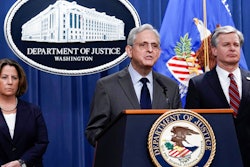French President Emmanuel Macron warned against trade wars in an impassioned speech about international cooperation Wednesday, two days before the Trump administration decides whether to hit Europe with punishing new tariffs.
Top European officials are holding last-ditch talks with the U.S. commerce and trade chiefs on steel and aluminum tariffs that the U.S. plans to enact from Friday.
The U.S. plan has raised the threat of retaliation from Europe and fears of a global trade war — a prospect that is already weighing on investor confidence and could hinder the global economic upturn.
"Unilateral responses and threats over trade war will solve nothing of the serious imbalances in the world trade. Nothing," Macron said in a speech at the Organization for Economic Cooperation and Development in Paris.
In a clear reference to U.S. President Donald Trump, he added: "These solutions might bring symbolic satisfaction in the short term ... One can think about making voters happy by saying: I have a victory, I'll change the rules, you'll see."
But he said that those "who waged bilateral trade wars ... saw an increase in prices and an increase in unemployment."
Tariffs on steel imports to the U.S. can help local producers of the metal by making foreign products more expensive. But they can also increase costs more broadly for U.S. manufacturers who cannot source all their steel locally and need to import the raw material. That hurts the companies and can lead to more expensive consumer prices, economists say.
Macron also proposed to start negotiations between the U.S., the EU, China and Japan to reshape the World Trade Organization to better regulate trade. Discussions could then be expanded to include other countries to agree on changes by the end of the year.
With the tariffs looming Friday, U.S. Commerce Secretary Wilbur Ross and U.S. Trade Representative Robert Lighthizer were meeting Wednesday and Thursday in Paris with EU, French and German officials.
Besides the U.S. steel and aluminum tariffs, the Trump administration is also investigating possible limits on foreign cars in the name of U.S. national security.
EU Trade Commissioner Cecilia Malmstrom, ahead of her meetings with Ross and Lighthizer, tweeted that "the EU wants to be fully excluded from these tariffs and rather engage in a positive transatlantic trade agenda."
Ross criticized the EU for its tough negotiating position.
"There can be negotiations with or without tariffs in place. There are plenty of tariffs the EU has on us. It's not that we can't talk just because there's tariffs," he said. He noted that "China has not used that as an excuse not to negotiate."
Speaking on a panel on international cooperation, Ross expressed concern that the Geneva-based World Trade Organization and other organizations are too rigid and slow to adapt to changes in global business.
"We would operate within (multilateral) frameworks if we were convinced that people would move quickly," he said.
If the U.S. goes ahead with its tariffs, the EU has threatened to impose retaliatory tariffs on U.S. orange juice, peanut butter and other goods in return.
Ross and Lighthizer seemed like the odd men out at this week's gathering at the OECD, an international economic agency that includes the U.S. as a prominent member.
The agency issued a report Wednesday saying "the threat of trade restrictions has begun to adversely affect confidence" and tariffs "would negatively influence investment and jobs."
The OECD also said persistent high oil prices could push up inflation and push down household incomes. After a first-quarter slowdown, the agency slightly revised down its forecast for world growth this year to 3.8 percent, with 3.9 percent expected next year.





















